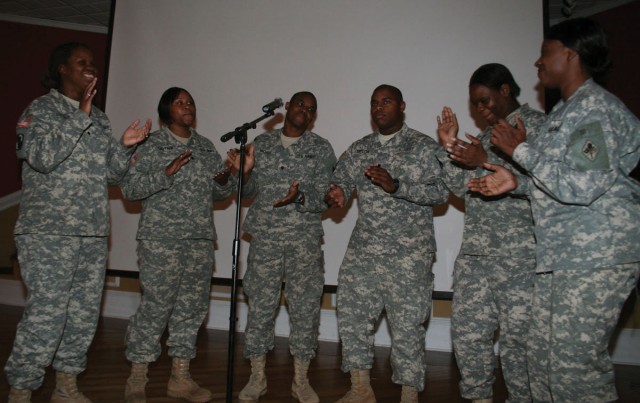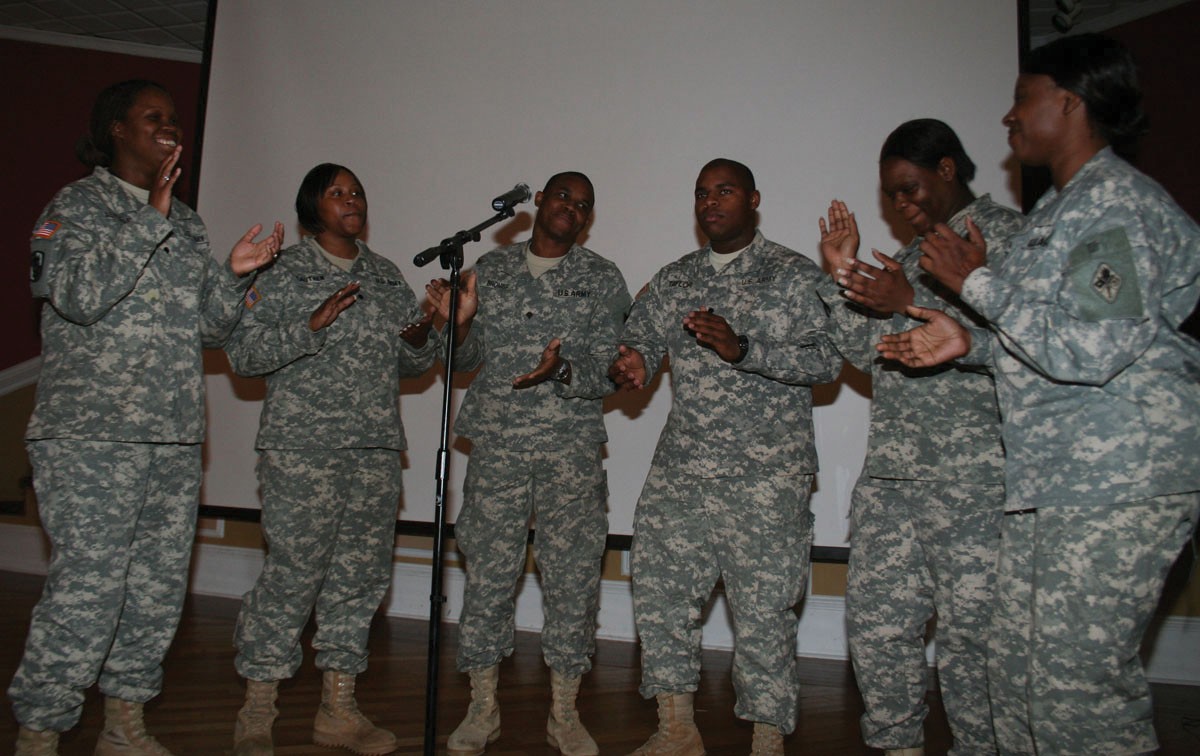In the midst of war, service members and the Fort Gordon community came together Feb. 18 to observe the "National Prayer Breakfast." They joined many Americans around the country celebrating this occasion. This year's theme was "Partnering Together for Peace."
A crowd of 360 people filled the Gordon Club's Ballroom before sunrise to hear from a New York rabbi and a police officer who kept their faith in the face of tragedy during the attack on America Sept. 11, 2001.
Chaplain (Col.) Craig Wiley, the installation chaplain, began the program by welcoming everyone and giving a brief explanation of the origin of the National Prayer Breakfast. In 1953, President [Dwight] Eisenhower presided over the first National Prayer Breakfast in Washington, D.C., said Wiley. "It is a time to give thanks to God for what we have and to ask him for our protection."
Spc. Paula Ashcraft, Company A, 63rd Signal Battalion, led the group in singing the national anthem. Chaplain (Col.) William Laigaie, the 7th Signal Command [Theater] Chaplain, gave the invocation, and members of the U.S. Army Signal Corps Band's Woodwind Quartet played music while guests enjoyed a buffet breakfast.
Chaplain (Lt. Col.) James Duke, Director-Clinical Pastoral Education Program at the Dwight D. Eisenhower Army Medical Center, joined Chaplain (Maj.) Mark Munson, Southeast Regional Medical Command Wounded Warrior chaplain, on guitar and sang "Heal Our Land" by Michael Card.
Brig. Gen. Jeffrey Foley, U.S. Army Signal Center of Excellence and Fort Gordon's commanding general, and Command Sgt. Maj. Thomas Clark, U.S. Army Signal Center of Excellence command sergeant major, were unable to attend the breakfast. "They are in California helping a fallen Signaleer's family with funeral arrangements," said Wiley. Clark sent a DVD in which he recites the poem, "This Old Flag," and this was shown.
Prayers were then offered to the nation, the Armed Forces and the community by Chaplain (Capt.) Karlyn Maschhoff, 442nd Signal Battalion chaplain; Chaplain (Maj.) Mark Munson, Southeast Regional Medical Command Wounded Warrior chaplain; and retired Chief Petty Officer Marshall Abuwi, Islamic Lay Leader. Maschhoff read, "A Prayer for the Nation," by Thomas Jefferson, which he gave March 4, 1801 in Washington, D.C.
The Chaplain Assistant Choir sang "Lord You are Good" and "My Worship is for Real."
This was followed by Wiley introducing the first guest speaker, Sgt. Brian Reilly, a 26 year veteran of the New York City Police Department. He is currently the NYPD Chaplains Unit's commanding officer.
Reilly was also the immediate past president of the N.Y.P.D. Holy Name Society. In his biography it stated that as the N.Y.P.D. Holy Name Society past president he had been a pioneer in the area of ecumenical relations and has formed a special bond with the N.Y.P.D. Shomrim Society (a society of Jewish Officers). Both organizations made five trips to Israel together as well as a trip to Auschwitz in Poland and Jordan.
The John Jay College of Criminal Justice alumnus is the first police officer in his family. During his spare time he cooks for the homeless at a soup kitchen in South Bronx, N.Y.
Reilly opened his talk by expressing his appreciation to the military. My father fought in the Battle of the Bulge during World War II so I understand the sacrifices you make, he said. Then he answered a question. "Someone asked me if it's true New York City police officers eat a lot of donuts," he said. I would have to say yes.
After the laughs, Reilly gave his personal account of Sept. 11, 2001. "I was at my desk at the police department when I heard a loud explosion," said the officer. "My wife's photo fell off the wall because of it."
There had been some construction nearby so he didn't give it much more thought.
"Then the ground started to rumble," he continued. "We heard another explosion. One of the officers rushed into the station and said, "They just blew up the World Trade Center."
"I ran outside and saw a hole in the side of the building," he explained. " It took up four stories.
"At this point we knew it was an attack," said Reilly. "I called my wife and asked her if she had spoken to Lorraine [her sister]. My wife said she was ok.
"She is in the other building [South Tower was hit later]. All the people in her building are being asked to remain inside because they feel it's safer because of all the debris that is falling to the streets.," said Reilly's wife. [At 8:46 a.m. American Airlines Flight 175 crashed into the World Trade Center's North Tower, followed by United Airlines Flight 175, which hit the South Tower at 9:30 a.m. Sept. 11, 2001, according to www.enwikipedia.org. Lorraine Lee, his sister-in-law worked at the time on the 101st floor of the South Twin Towers. ]
"I had been at the World Trade Center bombing in 1993 and I was concerned about what was happening now," he said. [The 1993 World Trade Center bombing occurred on February 26, 1993, when a car bomb was detonated below the North Tower of the World Trade Center in New York City. The 1,500 lb. urea nitrate-hydrogen gas device was intended to knock the North Tower (Tower One) into the South Tower (Tower Two), bringing both towers down and killing thousands of people. It failed to do so, but did kill six people and injured 1,042, according to www.en.wikipedia.com].
A short time later Reilly called his wife again. "I told her I didn't like what I was seeing outside and I think you should call your sister again and tell her to forget what they are telling them. She needs to get out of the [South Tower] building," he advised his wife. After the second call to his wife he was not able to talk to her again because of problems with the phone lines. He had no idea what happened to his sister-in-law.
Later that night he learned his sister-in-law didn't come home. His wife had tried to call her back early, but could not reach her.
"I lost my sister-in-law in the attack," he added.
Reilly talked about the sounds and smells at the scene in which he will never forget. "I can't get the smell of burning electrical wires and rubber out of my nose," he explained. "Most of us were covered with dirt and dust. After the smoke cleared the second tower fell. Soot was a foot deep.
"Although it was the worst day in New York City, it was probably our finest hour," he added. "Young people were helping the elderly. People of all races were working together. There was no discrimination.
"I was very proud of the city that day," Reilly said.
"You are paid to be Soldiers," he told the uniformed guests. "We were paid to be police officers. But on that day the civilian population stepped up to the plate. They are the unknown heroes. One was a janitor who stayed to help open doors for people. There were secretaries who remained behind to assist disabled co-workers and men who helped carry a co-worker confined to a wheelchair down the stairs. They knew they would not get out alive, but, they cared enough to help others.
"We won that day," said the New York City police officer. "We arose above the tragedy. The next day people got on buses and subways and went to work."
"Here at Fort Gordon you are doing the same by doing your job every day," he added.
The New York police officer concluded his talk with a quote from TV-radio personality Joe Franklin. "He always signed off his program with these words," Yesterday is history, tomorrow is a mystery, but today is a gift and that's why we call it the present."
Then Wiley introduced Rabbi Alvin Kass. He was appointed to the New York City Police Department in 1966, making him the most tenured chaplain in the NYPD. In 2002, he was promoted to chief chaplain. Besides counseling and offering spiritual guidance to officers of all ranks for 36 years, he talked a suicidal man off a ledge at the World Trade Center in 1977 and in 1981 convinced an armed gunman to release several female hostages from a midtown office building, according to the program biography.


Social Sharing